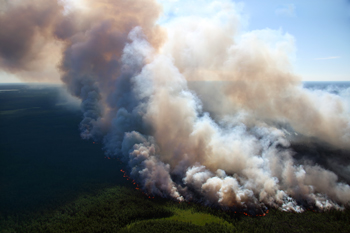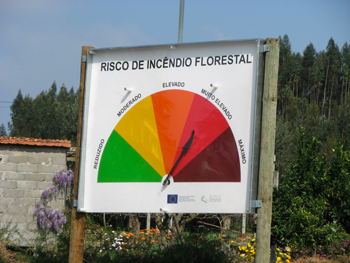Forest fires and insurances in Portugal
Although partnerships are no ‘one-size fits all’ concept, learnings from Santarém can be transposed and adapted in other European Union regions.
Every year, forest fires have a major impact on urban areas and the environment in Portugal. In 2003, the district of Santarém, Central Portugal, was severely affected by wildfires, with almost 64 thousand hectares burned. With respectively 26% and 48% of municipality area burned, Chamusca and Mação were most severely hit, facing multiple fatalities and several houses destroyed.
Considering the extent of area burned, and extensive damage sustained, the Santarém district offered a suitable case study for the ENHANCE project.
The goal of the Portuguese case study was to analyse the Multi-Sector Partnership (MSP) and the economic instruments (e.g. insurance) which could promote the society’s resilience to forest fires. The case study area is one of the few areas in Portugal with two forest insurance products in place, one more directed to the pulp and paper industry and the other more directed to the diverse forest owners.

Multi-sector partnership
The multi-sector partnership consists of the Intermunicipal Commission for Forest Fire Defence (CIMDFCI – Chamusca) from the municipalities Chamusca, Alpiarça, and Almeirim, and the Municipal Commission for Forest Fire Defence in Mação (CMDFCI – Mação).
The Forest Fire Defence Commissions, 220 in total, covering the entire country, were established as a response to the wild fire season in 2003, which was the worst ever recorded in Portugal. These commissions, or MSPs, were included as one of the strategic tools in the Portuguese National Plan for Forest Fire Defence (RCM no65/2006). The MSPs develop their actions at a local level, in cooperation with the population, the forest owners, and the active forces from the municipality. They have the responsibility to coordinate the actions between the different stakeholders involved in forest protection, as well as to further develop the Municipal Plan for Forest Fire Defence – PMDFCI and the Municipal Operational Plan – POM.
The MSP consists of both public and private institutions, where each institution has very specific competences within the National System for Forest Fire Defence. Although the public sector has a major role in the functioning and coordination of the MSP, the inclusion of the private sector is of major importance, since close to 90% of the Portuguese forests are privately owned. This means that the MSP would, for instance, strongly benefit from the inclusion of the forest owners’ associations or the pulp industries with their firefighting teams.
While most of the work developed by the MSP reflects the strategic planning for both the structural (PMDFCI) and operational actions (POM), their coordination is the responsibility of the Mayor, and the municipality is responsible for management and implementation.
Several analyses were performed during the project to assess the viability of the MSP, the current risk levels, and the possible solutions to further manage risk:
- assessment of the MSP healthiness and preparedness using the ‘capital approach’;
- forest re risk assessment for the district, using probability loss curves;
- assessment of the meteorological component of the forest re risk;
- assessment of the MSP perception of future scenarios;
- evaluation of the possible use of different economic instruments, including insurance and risk policy management.
Both quantitative and qualitative methodologies were applied.
The results were discussed with the members of the MSP studied.


Useful links
- Interactive overview of water risks in the world (Word Resources institute)



